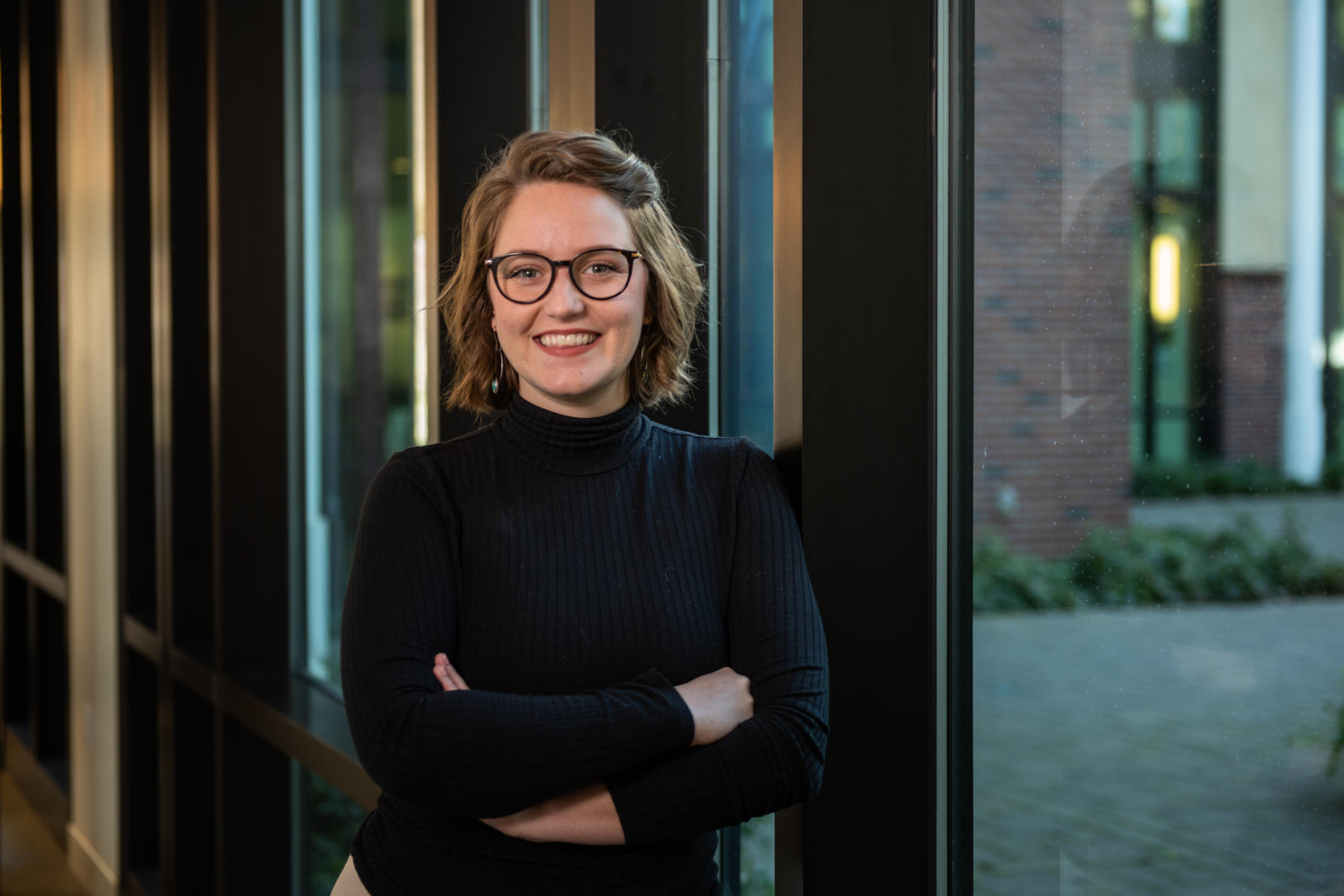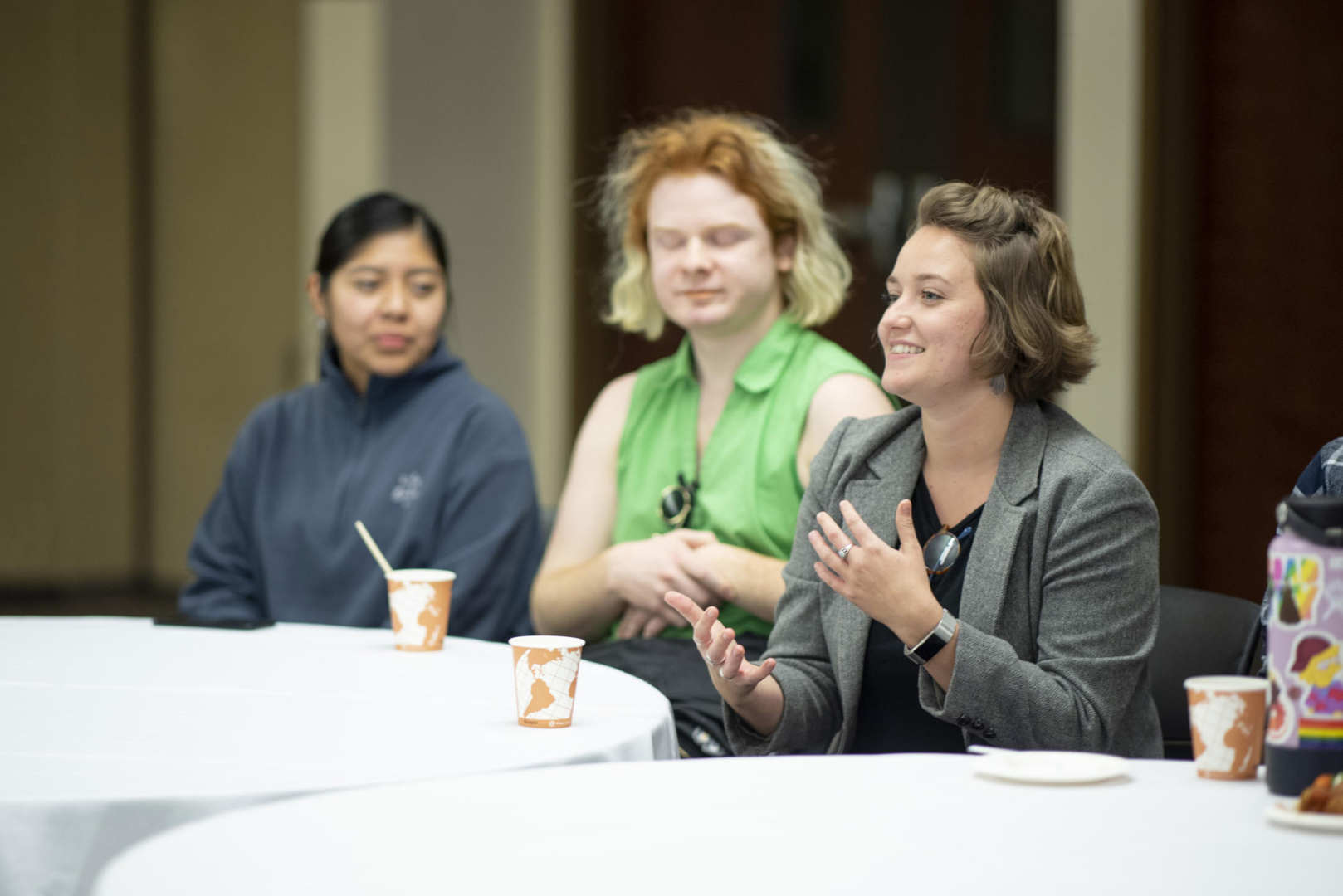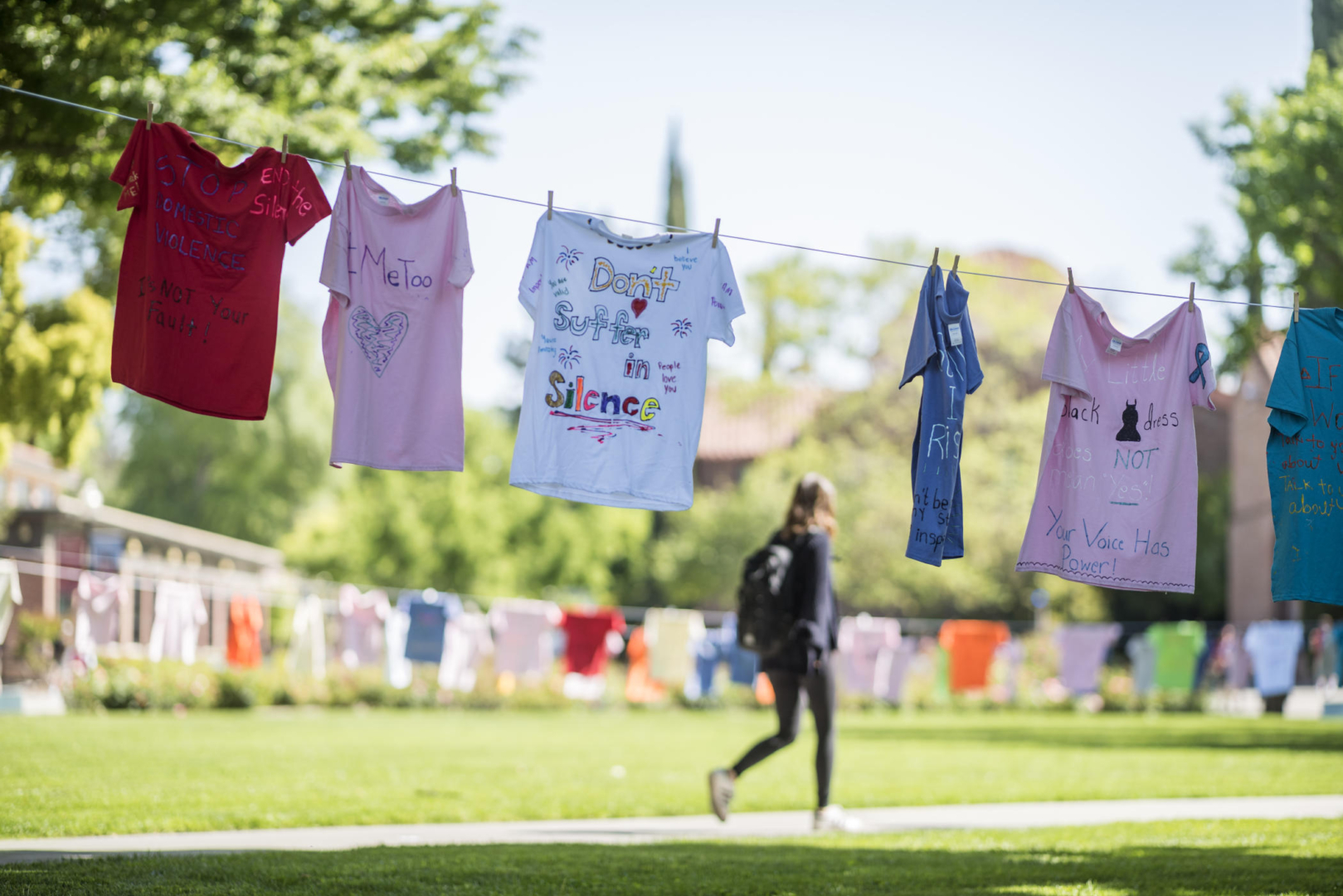Championing Advocacy and Awareness

Alix MacDonald, is the Safe Place Assistant Director, photographed on Monday, March 2, 2020 in Chico, Calif. The mission of Safe Place is to support and advocate for victims and survivors of sexual assault, intimate partner violence, and stalking through crisis intervention, prevention education, resources and referrals. (Jason Halley/University Photographer/CSU, Chico)
“I am not free while any woman is unfree, even when her shackles are very different from my own.”
This framed quote in Alix MacDonald’s office reminds her and her clients that interpersonal violence affects us all, no matter what form it takes, and support for its victims and survivors is imperative.
WellCat Safe Place recognizes its 10th anniversary this year—marking a decade of campus support for victims and survivors of sexual assault, intimate partner violence, and stalking. As its advocate administrator, MacDonald is a relentless champion to ensure victims and survivors receive the aid they need, while also raising campus awareness about the dynamics and prevention of interpersonal violence.
“The way this work is valued at Chico State, we are the best in the system in terms of caring for and treating people with respect and dignity,” she said.
Since its founding a decade ago, Safe Place has provided confidential services to thousands of students, faculty, and staff. Today, it helps hundreds of individuals each year, offering information and a listening ear to those in crisis; accompanying visits to the hospital, law enforcement interviews, and Title IX meetings; helping obtain restraining orders or creating safety plans; and aiding in academic, scheduling, and housing accommodations for those who feel unsafe on campus or in the classroom due to interpersonal violence.
“Everything we do in this work is optional for everyone else,” MacDonald said. “We’re the only person sitting at that table who doesn’t have to be there. It’s a constant battle to be taken seriously, to feel your job is more than holding someone’s hand.”
With a genuine effusive kindness and magnetic warmth, she leads a small team of two staff and five students, and takes an active role in every service Safe Place offers. She wants their clients to not just feel safe and supported but to know the University is committed to their success.
There is no better outcome, MacDonald said, than watching student survivors of trauma persist with their education and achieve their degree.
“They make it. They are courageous. They are smart. They are resilient,” she said. “To see this work is truly valuable in someone’s life and is propelling them forward is so incredibly rewarding.”
Helping others discover their resilience is a personal passion for MacDonald, who graduated from University of South Indiana in 2016 with a double major in psychology and gender studies. After working in domestic violence and rape crisis intervention, she realized higher education might be her calling.
She had never heard of Chico State—or even been west of Indiana—but she came to visit and fell in love with what she felt was a Midwestern vibe. She was hired in October 2017.
“On a personal level, it completely changed my life,” she said, noting that she soon found herself engaged on campus in environmental work, diversity issues, and intersectional opportunities like never before.
In the last three years, MacDonald has increased Safe Place’s services by more than 284%, tripled staffing, and secured a new location in the Student Services Center to ensure easy access to crisis intervention, prevention education, and other resources. With a passion for holistic wellness, her big dreams for the future include a focus on intersectional trauma and bystander intervention.

Nationwide, it is estimated that 1 in 5 females and 1 in 16 males experience sexual assault while in college, and over 90 percent of victims do not report their assault to law enforcement. Additionally, nearly half of dating college women report experiencing violent and abusive dating behaviors from their partners.
Wanting to get a clearer picture of how those numbers translate locally, she helped lead the 2018 Chico Speaks survey, which affirmed those who report experiencing sexual violence are not alone at Chico State. She also launched several new programs, including participation in the national Clothesline Project, where shirts are decorated by or in honor of those who have experienced violence, and Bro Talks, a conversation series with male-identified students about their role in preventing dating violence and sexual assault.
MacDonald has also been forming strong partnerships with Gender and Sexuality Equity Coalition and the Cross-Cultural Leadership Center, in hopes of reaching student populations who historically have not felt comfortable accessing such services. Advocacy work is most often done by white women, she said, and she wants to ensure everyone feels welcome and supported by Safe Place.
“How can I make services accessible to people who look like me or don’t look like me or who don’t share my same perspective?” she said.
Title IX Coordinator Dylan Saake has worked closely with MacDonald since her arrival, as their work often intersects while he investigates cases in which her clients may be victims, and said he values her as a colleague. While they have different perspectives and at times can be at odds with one another, they share a mutual respect and a goal to see the end of interpersonal violence.
“She wants us to be better as an office and as people working with people of interpersonal violence,” he said. “She gracefully points out things we can do better and in ways that make us want to be better.”
While working together on the Chico Speaks survey, MacDonald was one champion who took the resulting data and identified potential actions that could come from it, Saake said. He admires how she approaches her advocacy not just on behalf of individuals but also the way society and institutions address issues of interpersonal violence.
“She wants [Safe Place] to truly be available and serve as many people as possible, as many genders, as many groups on campus,” he said. “She wants to get everyone involved in the work and believe they have a role.”
Ultimately, MacDonald’s vision is for Safe Place and the WellCat Counseling Center to be a unified center that takes over the fourth floor of the Student Services Building. She’d like to hire another advocate and a specialty therapist for trauma. And she hopes to help launch Wildcats Thrive, a new, collaborative initiative that aims to cultivate a campuswide culture of holistic well-being by addressing all aspects, from emotional and physical to financial and intellectual to relationship and vocational. She envisions Safe Place will have a lot to contribute.
“In the grand scheme of our University and its mission, we are so small,” she said. “But I’ve always been a really big-picture thinker. Instead of looking at a tree, I look at a whole forest. And with Wildcats Thrive, I know that will trickle into the students that I’m serving.”

Three years after starting, MacDonald finally feels like her head is above water. She’s no longer drowning in her work—or the emotion that accompanies it. Admittedly, she said, advocates are often working alone as they help people through horrific experiences of assault, stalking, and trauma.
“Doing trauma work in isolation is a dangerous thing,” she said. “This is one of the high risks—to experience vicarious trauma and have high burnout.”
Just as she encourages self-care in her clients, she works diligently to practice it herself. She finds a lot of healing in cooking, gardening, and walking in nature.
“And I talk to someone that I love every single day,” she said, adding that she also has a rescue dog, Nora, whose unconditional love and vibrancy bring unbridled joy to her own life.
“I try to remind myself that yes, [violence] is happening all around us, but it’s not all that is happening,” she said. “There are still good people, and good men.”
Despite the darkness she often encounters, in supporting clients through violence, she is still filled with hope. By addressing the root of trauma and prevention, she thinks rates will gradually go down.
“Hurt people hurt people,” she said. “We need to put interventions in place so that it happens less and eventually never.”
“I believe in progress, and I believe it changes people’s lives in how they make decisions,” she added. “I have to have hope. If we have the brainpower and the willpower, we have the ability to change, and I think we do.”


